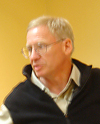|
Welcome to this edition of Perspectives, the e-newsletter of the
Stanford course Perspectives in Assistive Technology.
What
is the course? - Perspectives in Assistive Technology is a
Winter Quarter course at Stanford that explores issues surrounding the design,
development, and use of assistive technology for people with disabilities and
seniors. More information can be found on the course
website.
Invitation to attend - You are invited to attend
all class lectures. They will be held in the
Main Quad, Building 370, Classroom 370 on
Tuesday and Thursday afternoons at 4:15 to 5:30pm and are free and open
to the public.
Next class session - Tuesday, February 8th at
4:15pm:
|

|
Designing Beyond the Norm to
Meet the Needs of All People
Peter W.
Axelson, MSME, ATP, RET
Beneficial
Designs, Inc. |
Abstract: Peter will
talk about the difference between Universal, Adaptable, and Adaptive design.
Peter was the first undergraduate using a wheelchair for mobility to live on
the Stanford campus in 1976 when accessibility issues were just beginning to be
addressed. Those experiences and the desire to participate in the same physical
activities as every other college student who had professional and recreational
interests shaped his career as a designer. Peter will share how his interests
spawned the creation of Beneficial
Designs, Inc to support the development of personal, activity specific and
environmental technologies for people of all abilities. His experience in
obtaining Small Business Innovation Research (SBIR) Grants to develop and
functionally assess products, services and the designs of outdoor environments,
has provided many opportunities for he and his staff to change the way people
with impairments of all kinds are able to participate in all aspects of life
activity. His company works toward universal access through research, design
and education to enable persons of all abilities to participate in the
physical, intellectual and spiritual aspects of life.
Biosketch: Peter
Axelson is a rehabilitation engineer who sustained a spinal cord injury in a
1975 climbing accident while in the Air Force Academy. He continued his
education at Stanford University, where he began applying engineering and
design principles to overcome daily living hurdles faced by people with
disabilities. In 1981 he founded Beneficial Designs, Inc. an engineering design
firm dedicated to designing, developing, and testing assistive technologies.
His accomplishments include developing the first chairlift-compatible mono-ski
with a shock absorber, working to establish wheelchair testing standards,
developing seating systems for wheelchairs, and creating a system to assess
trails that will improve access to outdoor trails for people of all
abilities.
Peter is the founder and the
Director of Research and Development of Beneficial Designs and spends much of
his time traveling throughout the world attending meetings and presenting his
work. He's also a pilot and avid mono-skier.
        
        
       
Do
you have a question or comment? - David L. Jaffe, MS, the
course organizer, can be reached by email or at 650/892-4464.
|
|